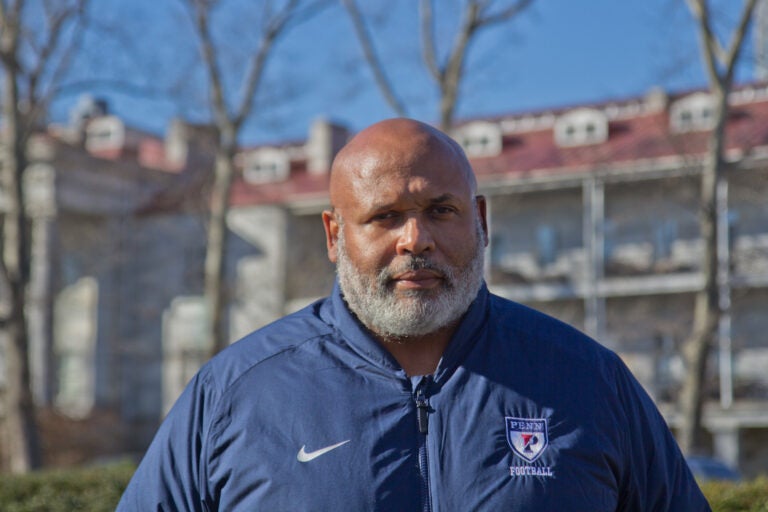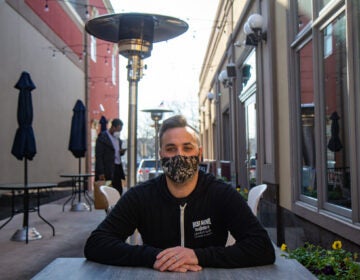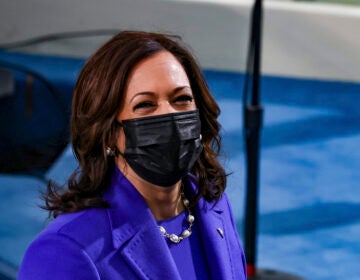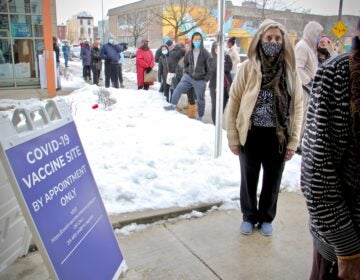Listening, not trying to convince: How Black Philadelphians are approaching vaccine hesitancy in their communities
Black people have been disproportionately affected by COVID-19. Many of them are the most distrustful of a vaccine.
Listen 4:28
Mike Pearson participated in the Moderna COVID-19 vaccine trial hoping to boost its confidence among Black Philadelphians. (Kimberly Paynter/WHYY)
Updated: 12:10 p.m. Tuesday
Ask us about COVID-19: What questions do you have about the current surge?
Mike Pearson has jumped out of airplanes. He’s trained for direct fire, close combat battles in Army Ranger School. He’s ridden motorcycles and driven his body head-first into linemen as a college football player.
Nothing has ever scared him more than COVID-19.
“It is very real,” said the 58-year-old Philadelphian, who has had two relatives die from the disease. “I don’t feel I’m immune from anything.”
Without much else to vest hope in, Pearson looked anxiously to the development of a vaccine as a light at the end of the pandemic tunnel. At the same time, he heard a lot of hesitancy surrounding a vaccine from fellow African Americans.
Pearson understood that many Black people come to their distrust of vaccines for good reason. His mother grew up in Alabama, not far from Tuskegee, where the U.S. government infamously enrolled Black men with syphilis in a study to see what would happen when the disease went untreated for years. The patients did not consent to the terms of the study and were not offered treatment, even when an effective one became widely available.
“The Tuskegee Experiments was not something you read about, it was something that affected friends and family in that area,” Pearson said. “We’re fighting against history.”
Still, he felt confident that the Pfizer and Moderna COVID-19 vaccines coming to market hadn’t cut corners to get through the regulatory process. He worried that if not enough Black people got the vaccine, it would put them in an even more vulnerable position than they’re already in, where they are more than twice as likely to become hospitalized with COVID-19 than white people.
“That doesn’t help any of us, because it’s going to leave us still subjected to COVID-19,” Pearson said. “It slows everything down, and more people die.”
So he did the only thing he could think of to lead by example and show his faith in the process: He enrolled in the Moderna vaccine trial.
It was as simple as sending a text message. From there, a nurse called him to determine his eligibility. On Nov. 3, Election Day, he traveled to a clinic at the Hospital of the University of Pennsylvania, where doctors and researchers spent several hours walking him through paperwork and signing legal documents. Then he was given one dose of either mRNA Moderna vaccine, or a placebo. He went back just before Thanksgiving for the second shot.
“In my mind, I think I had the placebo because it was so painless, even the injection site,” Pearson said. “At the end of the day, I don’t know what I got. But I can tell you, it wasn’t painful, nor was it extremely cumbersome.”
Confidence in a vaccine among African Americans is increasing, but it’s still low. According to the most recent national Pew Research Center poll, 42% of Black adults said they would definitely get or probably get the vaccine for COVID-19 if one were available today — up from 32% in September. They are by far the demographic group most concerned about getting vaccinated: 63% of Hispanic adults and 61% of white adults said they would definitely or probably get it, as well as 83% of English-speaking Asian Americans.
Black people are also the most likely to be affected by COVID-19: More than 70% of those surveyed said they know someone who has been hospitalized or died from the disease.
Locally, the Black Doctors COVID-19 Consortium polled its patients, most of whom are Black, to gauge interest in a vaccine. Out of the 583 people the consortium polled, 87% of whom were Black, the same proportion of people — 42% – said they would get the vaccine as soon as it became available. Nearly three-quarters of respondents said they worried the vaccine would be approved without adequate safety.
Officials at the Philadelphia Department of Public Health have heard the concerns about the vaccine being rushed. It’s also heard concerns that Black people will be last in line.
Health Department spokesperson James Garrow said the department is doing its best to honor both sets of concerns.
“We don’t want to make them first, we don’t want to make them last, we want to make sure it’s done in an equitable manner. How do you message that?” he said.
Garrow acknowledged that because of the historical distrust in public health agencies within Black communities, his department might not be the most appropriate to send the message. It is working closely with a vaccine advisory committee to partner with trusted community leaders to get the word out.
‘Access without empathy means nothing’
The most prominent of those partners is the Black Doctors COVID-19 Consortium, with Dr. Ala Stanford at the helm. A pediatrician by training, Stanford started the consortium in response to what she saw as inadequate testing of the Black community around Philadelphia.
Stanford said the first step in talking to Black people about the vaccine is to stop thinking about it as an argument you’re trying to win.
“We’re not convincing, we’re not coercing, we’re listening and we’re educating and allowing them to be vulnerable in a safe space,” said Stanford, stressing that people should be able to air fears and ask questions freely. “Access without empathy means nothing.”
She said that as hospitals begin vaccinating their staff members, many of whom are Black, they should be required to offer culturally competent education sessions. Block captains, doctors, pastors and other trusted voices in the community should be given evidence-based information to disseminate.
Stanford was cautious about making any recommendations before the Food and Drug Administration officially authorized a vaccine. Now that the agency has done so, she feels confident that, for many, the risks of getting coronavirus are greater than the risks of taking a vaccine. She thinks that the potential long-term effects of an mRNA vaccine on the body since one has never been approved before, is still an open question. It’s her position that being among the first to receive a new vaccine is a personal risk/reward calculation for each individual, but she does recommend that anyone who is regularly exposed to the virus and is at high risk of getting seriously ill, should get the vaccine.
Stanford herself hadn’t planned to get the vaccine at first, because she had COVID-19 in August and tested positive for antibodies. As time went on, however, she realized that her reason for waiting might not translate to the broader population, and that people were looking to her as an example.
“On Saturday, when we were testing people, there were so many people that said, `Doc, we so appreciate you all, we appreciate what you’re doing, and when you tell me to get that vaccine, I’m gonna roll up my sleeve,’” said Stanford. “I feel like I heard that 100 times.”
Stanford now plans to receive the vaccine along with members of her team on Wednesday.
The consortium will likely help administer the vaccines to essential workers once they become available to that tier of the public.
For his part, Pearson has been listening and educating as best he can. When he sees old high school classmates express concern on Facebook about the speed at which the vaccine was developed, he’ll explain that the pace was unprecedented because the investment from the government was, too — and that because the disease was so common, there were enough sick people to produce statistically significant results quickly.
But at the end of the day, he is his own best argument for his faith in the process.
“If I really thought this was dangerous, do you think I would submit to this study?”
Pearson hopes others will lead by example too. He joked that getting the COVID-19 vaccine should be the next Ice Bucket Challenge. In a world of viral content, Pearson said, this should be no exception.
“Make it something that catches on,” he said.
___
This article was updated to include additional comments from Dr. Ala Stanford.
Disclaimer: Michael Pearson sits on the board of Public Health Management Corp. and the William Penn Foundation, both of which support WHYY.

Get daily updates from WHYY News!
WHYY is your source for fact-based, in-depth journalism and information. As a nonprofit organization, we rely on financial support from readers like you. Please give today.



![CoronavirusPandemic_1024x512[1]](https://whyy.org/wp-content/uploads/2020/03/CoronavirusPandemic_1024x5121-300x150.jpg)




